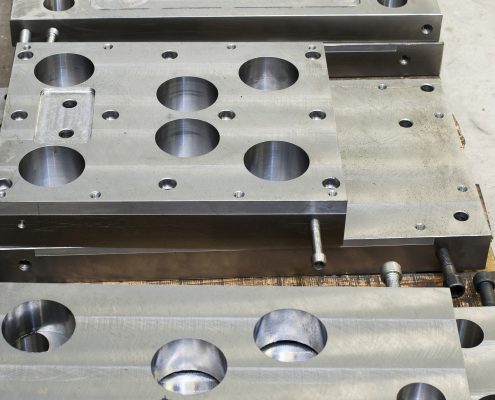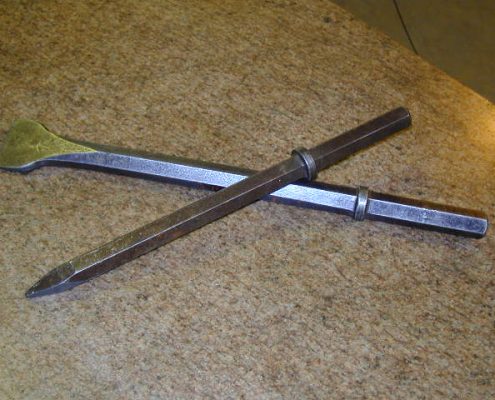Tool Steels
Lusco™ #7
NON-DEFORMING, SHOCK RESISTANT, DECARB-FREE TOOL STEEL
Lusco #7 is a superb choice of tool steel when applications call out for shock resistance at both high and low temperatures. This particular die steel is also excellent when impact and toughness are necessary. Consider this when specifications call out for AISI S-7 tool steel. Typical applications include: boilermaker tools, swaging dies, reamers, rivet busters, pipe cutter wheels and pneumatic chisels. Call or email us for a quote.
Spacing
Key Features
100% Decarb-Free (Pre-Machined Oversize)
Excellent Machinability
High Compression Strength
Excellent Impact and Shock Resistant
Good Non-Deforming Properties
Typical Surface Condition*
- Ground Top and Bottom – (+.015”/+.035” oversize)
- Sides Saw Cut – (+1/8”)
- Length Saw Cut – (+1/8” oversize)
- Surface Finish – RMS 125 or better
*As delivered (pre-machined condition)
Spacing
Applications
- Form Cutters
- Blacksmith Tools
- Pneumatic Chisels
- Swaging Dies
- Reamers
- Shear Blades
- Bending Dies
- Punching Dies
- Rivet Busters
Available Lengths
10/12 Ft Random Lengths and Custom-Cut-To-Lengths
Available Sizes
1/2″ up to 5″ Squares
Spacing
Thermal Treatment*
Annealing – Generally furnished annealed. Bring part up slowly (400°F/hour) to 1,550°F, and hold at temperature for at least one hour/inch of greatest cross section. Slow cool in the furnace (50°F/hour) to 1,000°F. Then allow cooling to continue in the furnace or still air.
Hardening – Bring up to pre-heat temperature at a rate not to exceed 400°F/hour. For large and intricate items, heat to a uniform 1,150°F/1,250°F, then elevate temp. to 1300°F/1400°F and hold for uniformity. Smaller and less intricate pieces may skip the first step and proceed right to 1300°F/1400°F. Take slowly to the hardening temp. of 1725°F. Hold at temperature (furnace or salt) for 30 minutes for the first inch of thickness, allow an additional 15 minutes for each additional inch of thickness.
Quenching – In air, pressurized gas, or warm oil to 150° F/125°F. Larger sections should be quenched in oil. If using an oil quench, then quench until black (900°F), cool in still air to 150°F/125°F.
Tempering Chart – Immediately after quench, hold at temp. for one hour/inch of greatest cross section (2hrs min.), then air cool to room temperature. Optimum tempering temp. for cold work tools is 400°F. Resulting hardness will be approximately 57 Rockwell “C”, which provides the maximum benefit of toughness to hardness. For sections larger than 6″ diameter, hold at tempering temperature for a min. of 6 hours. For hot work applications double tempering is required.
@ 400°F typical hardness Rockwell “C” 57 (air); Rockwell “C” 58.5 (oil);
@ 1,100°F typical hardness Rockwell “C” 48 (air); Rockwell “C” 48.5 (oil).
* Above values are typical and are not guaranteed.


